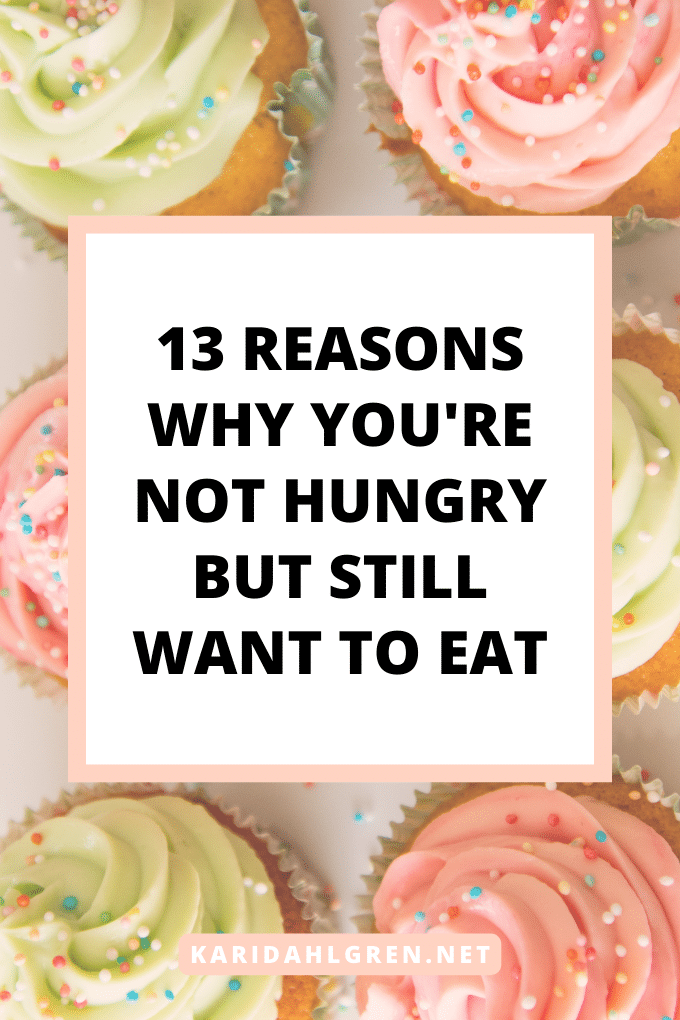
When I’m not hungry but want to eat anyway, it’s a sign for me to turn inward. Your state of mind and the way you respond to your environment play a strong role in the desire to eat without hunger.
While dieting merely focuses on biology, eating psychology seeks to explore and understand why you do the things you do around food, including the desire to eat even when you’re not hungry. With better self-understanding comes an opportunity for change.
If you’re ready to dig into the psychology behind overeating, I scoured plenty of clinical evidence to provide a helpful roadmap for learning how to stop eating when not hungry. By addressing both your biology and psychology, we can lay a solid foundation.
Discover your eating psychology strength: Even if you eat without hunger sometimes, I bet you have a hidden strength. My quiz reveals what that strength is. Click here to take the eating psychology quiz.
Part 1: Biological Reasons Why You’re Not Hungry but Want to Eat
No matter how much you finesse your psychology, it won’t make much of a difference if you’re still at war with your biology. The next time you find yourself wondering—why do I eat when I’m not hungry?—try to run through the following variables that affect the desire to eat when you’re not hungry:
1. Stress Triggers Hormones That Motivate Eating Without Hunger
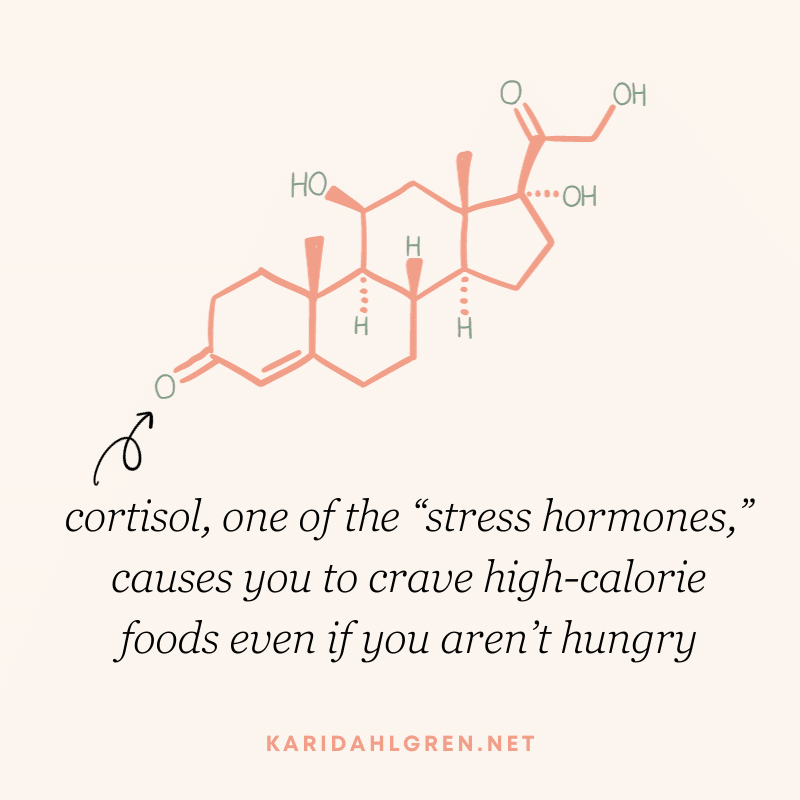
When it comes to cravings without hunger, stress hits twice as hard. First, the “stress hormone” cortisol motivates you to eat even if you aren’t hungry, according to a study published in the journal Minerva Endocrinology.[1]
Second, the types of food that you crave when you’re stressed are more likely to be “hyperpalatable foods,” or those high in fat, salt, and sugar, according to a study published in the journal Physiology & Behavior.[2] Often, these are the very foods we try to limit while eating healthy or seeking weight loss.
Furthermore, stress is a difficult emotion to live with (tense muscles, nervous energy) and high-reward foods offer a way to self-soothe. Couple this with eating behaviors like rewarding yourself with food and you have all the makings of becoming reliant on food to feel good.
2. Excessive Dieting Can Trigger the Desire to Eat Without Hunger
Diet culture encourages us to eat less, despite the ineffectiveness of restriction, and many of us have been dieting for so long that we begin to eat as little as possible subconsciously. If you find yourself in similar shoes constantly wondering, why do I want to eat when I’m not hungry, take a moment to reflect. Have you actually had enough to eat?
If you struggle with overeating or weight gain, you may think there’s zero chance that you haven’t eaten enough – yet clinical studies show that individuals who are overweight actually tend to eat less than people of normal weight.[3]
However, after many years of dieting, it’s normal for hunger signals to become muted, resulting in the desire to eat without the feeling of hunger, even though the body needs fuel. This is why I advocate for giving up dieting, healing your metabolism, and focusing on eating psychology instead.
3. Caffeine Can Suppress Your Appetite—Leading to a Desire to Eat Without Actually Feeling Hungry
Coffee and all caffeine-containing drinks have qualities that suppress your appetite.[4] If you tend to crave food even when you aren’t hungry, consider whether or not you’ve consumed caffeine, as it can mask your appetite. This is one reason why coffee and caffeine are linked to overeating.
When caffeine is running through your system, you won’t feel hungry even when you actually are. This can cause you to have self-doubting thoughts like, why do I eat when I’m not hungry, when in fact, you actually are hungry, you just can’t feel it.
4. Exercising at a High Intensity Can Also Suppress Your Appetite
Sometimes exercising at a high intensity can actually suppress your appetite so that you don’t feel hungry even when you are.[5] The next time you’re not hungry but want to eat anyway and you’ve been training like an athlete, treat yourself like an athlete too. That means eating nourishing food after a workout to help your body replenish itself.
5. Restricting Carbs Can Trigger Cravings for Carbs, Even When You’re Not Hungry
![restricting carbs causes cravings, regardless of hunger [image of food pyramid to an arrow pointing to the bottom row, which is full of carbs]](https://karidahlgren-net.b-cdn.net/wp-content/uploads/2024/01/why-do-i-want-to-eat-carbs-when-im-not-hungry.png)
A balanced diet includes a healthy mix of macronutrients: proteins, fats, and carbohydrates. A deficiency in any of these macronutrients can trigger cravings, even when you’re not physically hungry. Take a low-carb diet, for example. Your body needs carbohydrates for energy, and when you significantly reduce your carb intake, you might start craving carbs as your body asks for what it’s missing.
One explanation for this is glycogen, which is a stored form of glucose (sugar) that the body uses for quick energy. A low-carb diet may cause cravings for carbs because the body relies on glycogen for energy, and when carb intake is restricted, glycogen stores become depleted.[6] This can result in cravings for carbs regardless of physical hunger.
6. Low Quality Sleep Affects Your Hunger Hormones
A lack of sleep has been shown to decrease levels of leptin, the hormone that makes you feel satisfied and stop eating.[7] Have you ever finished a meal and still felt hungry after eating? Sleep-deprivation could be the culprit—along with a host of other possible reasons such as not eating a big enough meal.
7. Not Hungry But Want to Eat? Check Your Hydration Habits
At some point, you’ve probably read that dehydration can masquerade as hunger. However, after digging into scientific literature, I found little evidence in support of it, and I actually found many studies that refute it.[8], [9], [10] Reach for water because you’re trying to treat your body well, not because you’re trying to eat less.
As you can see, learning how to stop eating when not hungry often goes beyond biology and requires you to address your psychology too. If your healthy habits are already in good shape, it could be time to look deeper into the psychological causes of overeating.
Part 2: Psychological Reasons Why You’re Not Hungry But Still Want to Eat
The desire to keep eating even when you aren’t hungry is often compulsive. When it comes to stopping compulsive eating, I often like to reference the very definition of compulsion: an irresistible urge to behave in a certain way, especially against one’s conscious wishes. This is the essence of self-sabotage where we subconsciously act in direct opposition to our wishes.
If you want to learn how to stop eating when not hungry, it’s likely that you already know to get enough sleep and drink plenty of water. Often, the people who are left wondering, why do I eat when I’m not hungry, are the people who subconsciously self-sabotage, which means that your mindset is what matters.
Here are some psychological factors to consider the next time you’re not hungry but want to eat anyway:
8. Tiredness and Fatigue Can Trigger “Eating For Energy”—Even When You’re Not Hungry
Have you ever returned home from an exhausting day and instinctively headed straight for the pantry? This is a common response to fatigue. When you’re tired, your body often seeks a quick energy boost, leading you to reach for food instead of rest.
The link between fatigue and overeating is rooted in brain chemistry. Tiredness can reduce levels of leptin (the satiety hormone) and increase ghrelin (the hunger hormone), making you feel hungry even when you don’t need food.[11] The next time you find yourself wondering, why do I eat when I’m not hungry, ask yourself if what you’re really craving is a nap.
9. Mindless Eating Can Trigger Eating Without Hunger
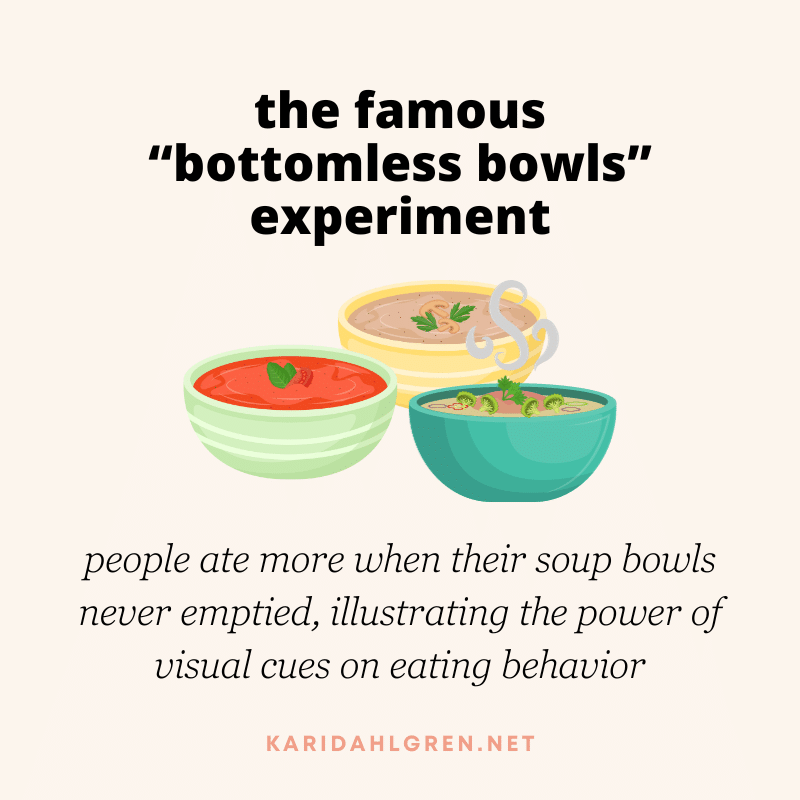
A hallmark study in the field of eating psychology is the “bottomless bowls” experiment, conducted by Dr. Brian Wansink. To illustrate the psychology of mindless eating, participants were given self-refilling bowls without their knowledge. The results were astonishing: individuals with bottomless bowls ate significantly more soup than those with normal bowls, simply because their bowls never emptied, removing a visual cue for fullness.[12]
Does this mean that you need to check the bottom of your bowl the next time you’re not hungry but want to eat? Probably not, but it’s a great reminder of how easy it is to eat on “autopilot” when you aren’t paying attention. When possible, try to eat your meals without distraction. Try not to be too hard on yourself if, on some days, you still find yourself eating while distracted. If your inner critic is already too loud, you don’t need any additional self-criticism.
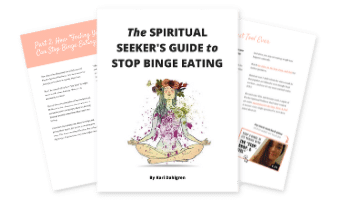
Silence the inner critic: Learn how to unwind your eating psychology with compassion in my free ebook, The Spiritual Seeker’s Guide to Stop Binge Eating. (Link opens a pop up so that you don't lose your place)
10. Snack Habits Can Make You Want to Eat When You’re Not Hungry
Back when I was struggling with compulsive eating, Netflix was a common trigger. Any time I plopped down onto the sofa to watch Netflix at the end of a workday, I found myself craving a snack to accompany my “feel good” moment. While there are many layers of eating psychology to peel back here, the most notable one is “hedonic eating:” the desire to eat for pleasure instead of hunger.[13] (Sounds familiar when you’re not hungry but want to eat?)
One of the best tips for stopping hedonic eating is to find joy outside of food. However, the journey often goes beyond this step, because in my own example, the problem of hedonic eating was compounded by an activity that I enjoyed: Netflix. Instead of adding more joy to my life, I actually needed to work on allowing myself to feel and process my emotions instead of staying constantly distracted from them. My Stop, Drop, & Feel tool is perfect for this—more on it soon.
11. Boredom Can Trigger Overeating—But Not in the Way You Might Think

Speaking of emotion, let’s talk about what happens when there’s a lack thereof: boredom eating. Boredom is a common trigger for craving food when you aren’t hungry.
In a remarkable study examining why people eat when not hungry, researchers observed participants involved in a boring, monotonous task. Then, these participants were given two options: unlimited access to candy or the ability to self-administer electrical shocks.
Predictably, they consumed more candy when bored. However, a surprising outcome was that these individuals were also more inclined to self-administer electric shocks compared to those engaged in a neutral task.[14]
While hedonic eating is about seeking pleasure from food (even when you aren’t hungry), boredom eating is about seeking any feeling at all—positive or negative. This insight is crucial for understanding the subconscious motivations behind the question, why do I eat when I’m not hungry? Like anything related to eating psychology, the answer is far more complex than it may initially seem.
12. Feeling Obligated to Eat When Others Are Eating—Even If You Aren’t Hungry
Do you tend to eat when others are eating? If so, you’re not alone. Studies have found that people commonly eat more in the presence of others, especially family and friends.[15] This is known as the “social facilitation of eating,” and it can explain the desire to eat despite not feeling hungry. People have a deep desire to invoke positive feelings in others, even if it means eating without hunger.
13. Poor Environment Design Can Encourage Eating Without Hunger
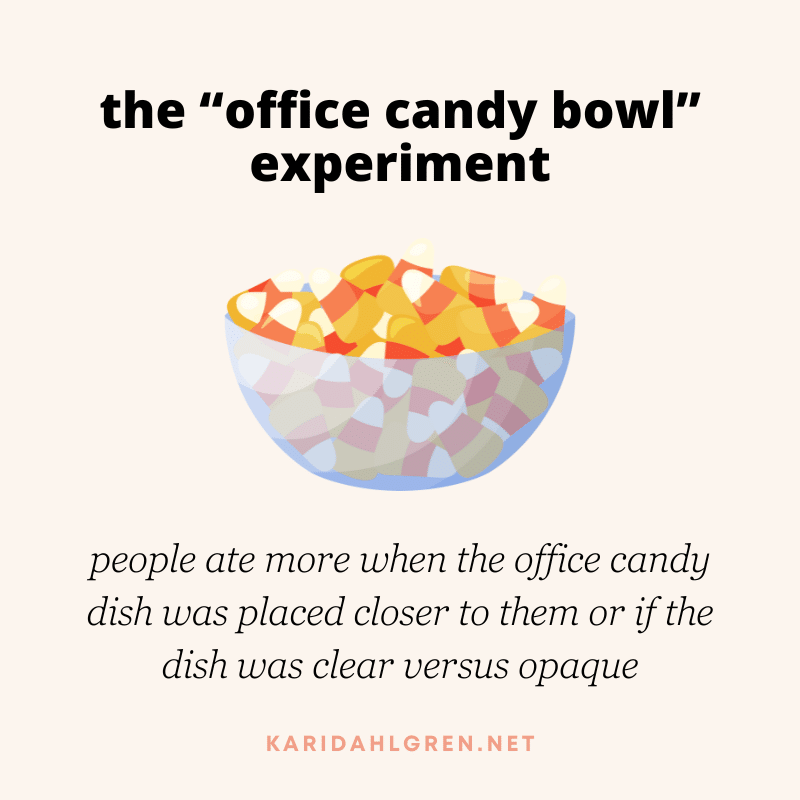
The next time you’re not hungry but want to eat, take a look at your environment. When food is nearby and visible, you are more likely to eat—regardless of hunger. Although this is an intuitive phenomenon, it was also demonstrated in another hallmark eating psychology study conducted, again, by Dr. Brain Wansink.[16] In this study, office candy dishes were carefully placed, rearranged, and observed.
Remarkably, when the candy dish was placed on an employee’s desk, they were found to eat significantly more candies compared to when the dish was just six feet away. The ease of access and the constant visual reminder of the candy led to mindless, automatic snacking, regardless of hunger levels. This study highlights how poor environmental design, such as having snacks within easy reach, can inadvertently trigger eating regardless of hunger levels.
How to Stop Eating When Not Hungry: Applying Eating Psychology
By now, you know all about the biological and psychological reasons for the desire to eat when you aren’t hungry. Now, what can you do about it? Since we previously discussed that dieting doesn’t help stop overeating, what else can you do to learn how to stop eating when you aren’t hungry? This is where eating psychology really shines.
Here are some tips to help you manage the urge to eat when you’re not hungry:
- Address restrictive dieting patterns: If you’re following a restrictive diet that leads to weight cycling (continuously losing and gaining weight), consider giving up dieting altogether and adopting intuitive eating instead. Unlike dieting, intuitive eating is linked with better body satisfaction, improved psychological health, and improved metabolic fitness.[17]
- Improve your self-care rituals: If you’re eating in response to emotions, find alternative ways to cope without food. Engage in activities such as journaling, walking, talk therapy, or even taking a nap to address emotional needs without relying on food.
- Develop awareness and tolerance for the emotions that drive compulsive eating: The next time you find yourself wondering, why do I eat when I’m not hungry, use my Stop, Drop, & Feel technique. It asks you to practice emotional self-inquiry in the precise moment that you want to eat without hunger. By improving your awareness and tolerance for these emotions, it reduces the subconscious pull to eat without hunger.
- Work on any patterns that drive the desire to eat without hunger: Aside from addressing your mindset, you can also support yourself through your surroundings. Be mindful of environment design and social cues. If you struggle with people pleasing, work diligently on your psychology to understand why you feel compelled to make other people happy, even at the expense of your health. Work with as many experts as possible, including but not limited to therapists, dietitians, and eating psychology coaches.
- Use self-inquiry to name the limiting beliefs behind self-sabotage: One of the best ways to understand the limiting beliefs that drive self-sabotage is to perform self-inquiry: asking yourself why you do the things you do. Workbooks are particularly powerful for this.
My workbook on stopping self-sabotage, Why We Do the Things We Do, prompts you to perform self-inquiry on the juiciest topics related to food and weight. Because limiting beliefs are often subconscious, I’m willing to bet that you’ll be shocked by some of the insights you gain. This is good news, because once you discover where you’re stuck, you’ll know exactly where to focus your attention on the path towards freedom around food.
Understanding Your Unique Triggers When You’re Not Hungry But Want to Eat
Navigating the desire to eat without hunger is a journey that involves both biological and psychological understanding. Remember, this path isn’t about self-criticism or adhering to restrictive norms; it’s about reshaping your external and internal environment to better serve your true needs.
As you apply these insights and strategies, be gentle with yourself, knowing that each step can bring you closer to a healthier, more balanced relationship with food. If you’re intrigued by the psychology of eating, don’t miss my free ebook below called The Spiritual Seeker’s Guide to Stop Binge Eating. It’s the perfect next step!

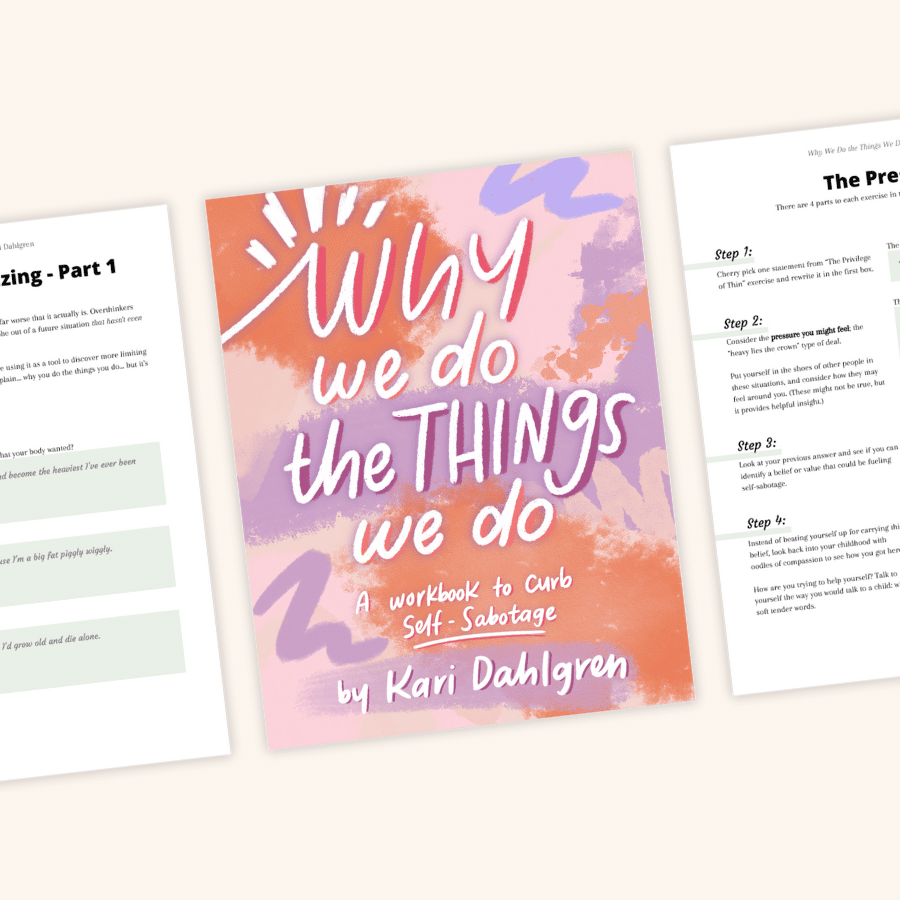
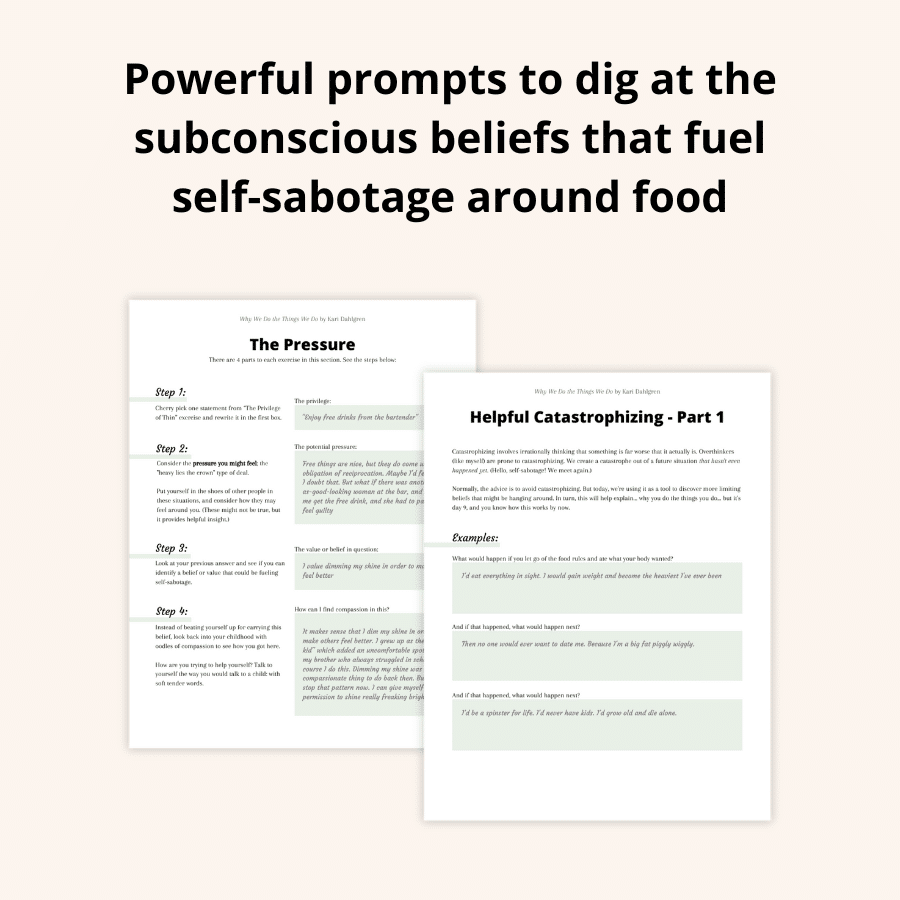



I think I may be sometimes boredom eating, but whenever I realise that, and go for the cupboard, I often stop myself and go back to whatever I was doing, but I’m not bored nowadays since I have my sewing to do. Now I’ve begun to realise that if there is food in the cupboard I will go to eat it, simply because there is food there. I want to know how to stop myself from doing that, and do you think it’s best to quell hunger by dinking something like water or tea. I really want to try my best to do intermittent fasting but I need to tackle this problem first.
Please help me.
Kind regards, chloe
Hi Chloe! Ohhh what a good question, and a big question too. Read my article on boredom eating and let me know if it helps. Whenever boredom is involved, there’s usually another layer to unpack. And I’m happy to help further.